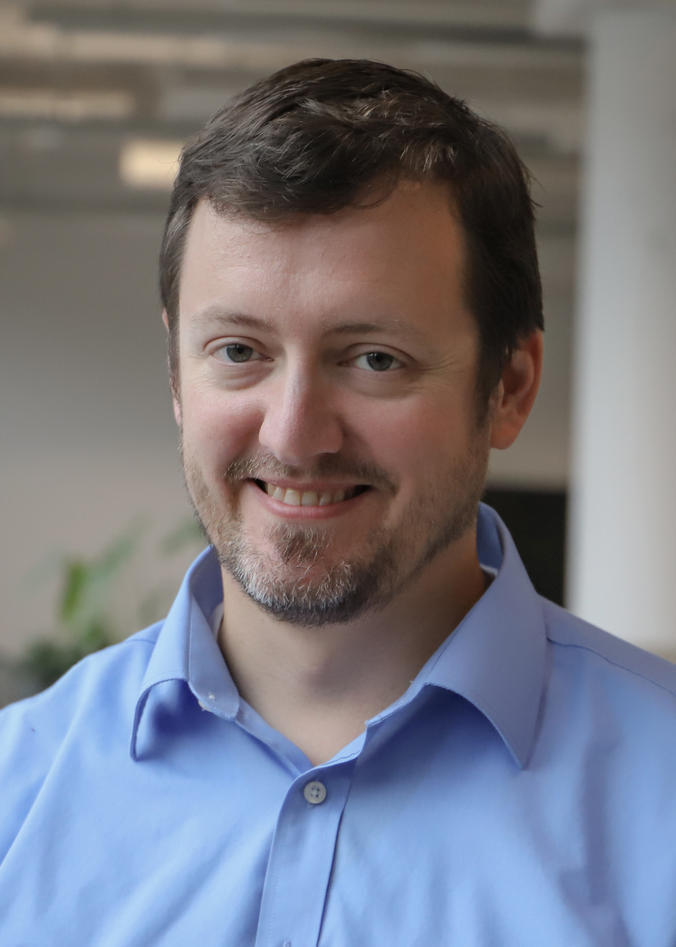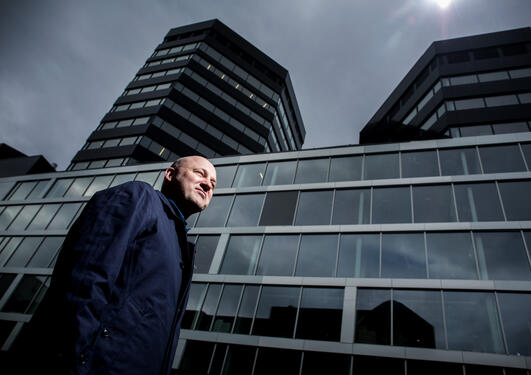"International exchange of perspectives are more important than ever"
Fulbright scholar Derek Lackaff is impressed with the facilities at Media City Bergen (MCB) and thinks that international exchange and knowledge-sharing are more important than ever.

Main content
Fulbright is a prestigious grant programme which supports study and research mobility between the USA and approx. 150 participating countries. One of those who has passed through the eye of the needle during the 2018-2019 application process is Derek Lackaff, who is normally an Associate Professor of communication based at Elon University, North Carolina, USA. He conducts research on and teaches subjects such as media and communications technology and digital media.
Consequently he will be teaching the Bachelor’s Programme in Media and Interaction Design for one year at the Department of Information Science and Media Studies at the University of Bergen (UiB).
“I have been following the UiB’s study programme initiatives at Media City Bergen with great interest for quite a while. I wanted to see how these programmes are developing with my own eyes and to follow the process up close, and to bring UiB some new perspectives from my own experience. That is the main reason why I applied to the UiB,” he says.
MCB at the forefront
Thanks to the UiB’s study programmes at MCB, Lackaff believes that the University lies at the forefront in this field. He is particularly impressed by the close links which exist between these programs and the surrounding media and technology companies in the cluster where students are engaged in practical work.
“Extremely interesting links are forged when education and businesses are located under the same roof and manage to engage in successful cooperation. The opportunities available for the students, the faculty and the companies are really unique at MCB,” he says.
Lackaff is also impressed with the culture of sharing which generally applies at MCB. However, the American does not think that a similar cluster, where several competitors operate under the same roof and share ideas and knowledge, will became a reality in his homeland any time soon.
In close proximity to businesses
“When you return home after your stay here, what are you hoping to take with you?"
“Lots of great inspiration,” says Lackaff, who elaborates as follows:
“Unlike at Media City Bergen, we do not have an “ecosystem” of media and technology companies operating in the same building where students can gain professional experience. However, we do have a strong focus at Elon on internships, global engagement, and other forms of experiential learning and I think there are many areas of overlap.
He thinks that a good course of studies should be varied and have a practical direction.
“Feedback received from student alumni at Elon University indicates that it is obviously important to learn the technical skills that you need for your career. However, my students also believe that it is important to learn about cooperation, problem-solving and communication with people with different roles, i.e. that in their studies they learn to work with different perspectives, see the bigger picture and switch between these multiple viewpoints.”
“I am keen for my students to learn about both the tools and the skills they will need in a labour market which is rapidly changing. That is something that also the University of Bergen has done successfully here at MCB.”
Similarities and differences
He sees many similarities, but also some differences, between teaching in Norway and in the USA.
“The actual classroom situation is similar in many ways, but there are differences in the structure and assessment methods used for courses. For example, in the USA greater focus is placed on student work that demonstrates learning throughout the course of their studies, while in Norway students are generally assessed on the basis of their final exams,” he says, adding:
“One special challenge for media and interaction design courses is that they often require a lot of project work and group work. How should work undertaken by students during the course of their studies be taken into account in their final assessments? As an “outsider” coming from a different educational tradition and experience, I can provide some different perspectives,” he says.
Seeking cooperation
Lackaff is eventually hoping to set up cooperation between students at the UiB and at Elon University.
“For example, I envisage the American students being able to create the foundations for this in a news feature story, which the Norwegian students could present in a new interactive format. I think that this would be interesting; since the students come from different countries, while at the same time they have a common mindset and access to digital work which obviously extends across national borders.”
Such a potential project is currently in the early stages of planning, but Lackaff thinks that this is one example which shows why exchange programmes, such as the Fulbright Programme, are so important. The programme was initially set up to increase mutual understanding between people in the USA and other countries, through the exchange of people, ideas and knowledge.
“These are values which are more important today than ever before,” he says, and he is hoping to welcome UiB researchers, lecturers and students on Fulbright exchange visits at Elon University in the future.

